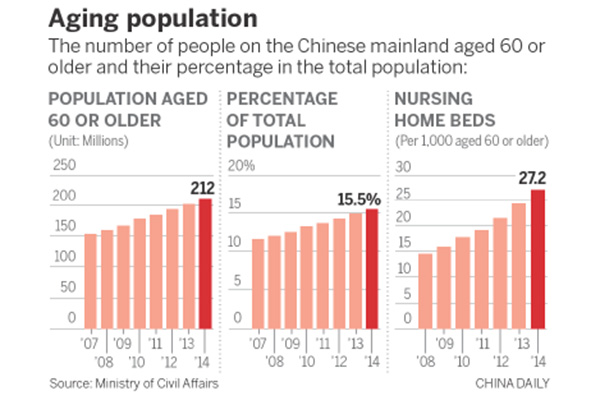
China will stage its largest annual political and legislative events-the “two sessions”-starting on March 1. China Daily takes a close look at a series of likely hot topics and catchphrases during the sessions.
Aging population: The aging of China’s population is progressing rapidly, with the number of people aged 60 and older expected to expand to one-third of the population by the middle of the century. But healthcare services for the elderly, such as rehabilitative and hospice services, are lacking in many places in China. Measures are being taken to cope with the challenges, such as encouraging the integration of elderly care with healthcare services to ensure that the elderly receive proper care.
Zhang Shouzi, a psychiatrist at Beijing Geriatric Hospital, has seen the number of patients seeking treatment for dementia in the hospital increasing over the past few years, resulting in some patients having to wait for weeks to get a bed.
“The situation may get worse in the future with the aging of the population in Beijing,” Zhang said. “The incidence of dementia rises with the increase of age, and up to 40 percent of people aged 85 or older may develop the condition.”
To cope with the growing number of elderly patients, the hospital is increasing the number of beds, and it opened a new complex in January, according to Yang Yingna, a publicity official of the hospital.
That complex has 400 beds and is equipped with better facilities to meet the increasing demands, she said.
With the rapid aging of the Chinese population, major cities such as Beijing are working out plans on coping with the healthcare needs of the elderly.
By the end of 2014, the number of Chinese aged 60 or older reached 212 million, more than 15 percent of the population, according to the Ministry of Civil Affairs. Some experts predict that it will swell to more than one-third of the population by 2050, when China will become one of the countries most heavily burdened by population aging.
Beijing had 3.2 million permanent residents aged 60 or older by the end of 2014, and their number is predicted to reach 4 million by 2020, according to the Beijing Civil Affairs Bureau.
President Xi Jinping said in February that coping with population aging concerns China’s overall development and the interests of hundreds of millions of people. He urged the government to improve major policies such as family planning, employment and elder care to cope with the problem.
China will encourage the integration of healthcare and elderly care services to meet the challenges, according to a guideline the State Council, or the Cabinet, released in November.
Preferential treatment
Under that guideline, by 2020 all hospitals and clinics in China will give the elderly preferential treatment in medical care, and all nursing homes will be equipped to give them health and medical services.
The Beijing Commission of Health and Family Planning will require all large public hospitals in the city to set up at least a department for rehabilitative medical services this year, and will choose six public hospitals to become specialized in rehabilitative care for the elderly, Fang Laiying, head of the commission, said on Thursday.
Health authorities will also encourage private investment in care for the elderly and nursing services, and will conduct research into establishing a standard for mid- and long-term elderly care and hospice services in hospitals this year, Fang said.
To cope with population aging and a consequent decline in the productive workforce, China adopted a law at the beginning of the year allowing all couples to have two children.
“Population aging will be an irresistible trend in China in the next several decades,” said Yuan Xin, a professor in population studies at Nankai University.
Already in 1999, more than 10 percent of the Chinese population was aged 60 or older-the benchmark percentage-and it has been growing ever since, he said.
China’s population aging is growing faster than in most other big countries, and the current social security system for elderly care and healthcare cannot cope with the trend, he said.
